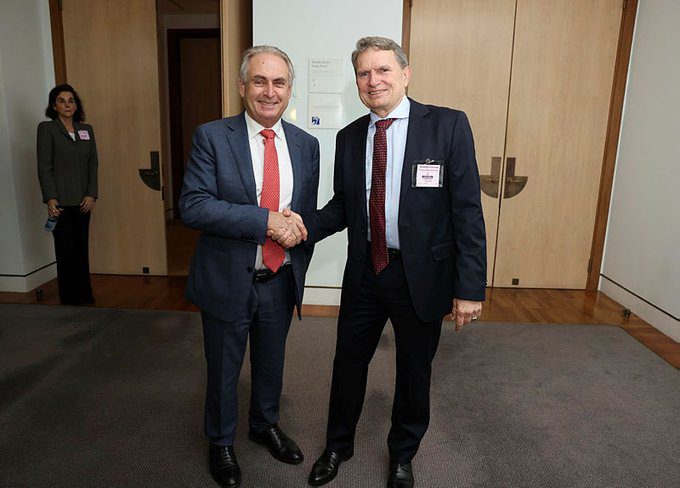
Australian Trade Minister Don Farrell with EU’s Ambassador to Australia, Michael Pulch
A free trade agreement between Australia and the EU looks increasingly in doubt as a disagreement over Australian agricultural products derailed any hope of a quick deal this side of the European elections.
Aussie trade minister Don Farrell left bilateral talks in Brussels frustrated, bemoaning that an agreement between the EU and Australia was likely to be kicked into the long grass due to an unresolved dispute over the import of Australian agricultural products into the European market.
Eurocrats and Australian officials have been wrangling for five years on a prospective trade deal with European agri lobbyists hesitant to open the door on cheap Australian imports, due to concern over Australia’s lack of compliance with strict EU green regulations. Media reports have been circulating that blame labelling rules around feta and prosecco as a major sticking point. As Australia’s Agriculture Minister Murray Watt said, speaking to the broadcaster ABC, his country was “not going to do a deal just for the sake of doing a deal.”
The breakdown of EU-Australia in talks is good news for Brexiters as Britain successfully secured a free trade agreement in 2021 which goes into effect this week, leaving the inflexibility of the EU to sign off on new trade deals as a major talking point in the Brexit debate.
Australian Prime Minister Anthony Albanese—eyeing European defence products—made an issue of lobbying EU Commission President Ursula von der Leyen and German Chancellor Olaf Scholz about the matter during the coronation of King Charles in London last month.
Collectively, the EU is Australia’s second-largest partner. The EU Commission estimates say that a successful deal could increase trade by €16 billion per annum.
Australia has marketed itself as an “energy rich and capital hungry” partner for the EU in recent years, with Australian climate minister Chris Bowen testing the waters on greater cooperation last month in Brussels.
Both sides had originally hoped to settle the matter by mid-2023, recognizing that negotiations were just a small part of an EU scramble for new trade deals to offset the closure of the Russian market due to sanctions and fears that China could follow.
A framework agreement signed in 2017 between the EU and Australia came into effect in October last year, promising greater foreign policy cooperation, as Canberra seeks Europe as a viable long-term alternative to the Chinese market despite a temporary respite in relations between Canberra and Beijing.
The EU has often been criticised for representing an inefficient protectionist barrier: special interests around the Continent with inflexible bureaucracy have made it difficult for free trade deals to be brokered.
Reuters reported that the stalled EU/Latin American agreement—with Mercosur, a South American trade bloc made up of Argentina, Brazil, Paraguay, and Uruguay—is being fast-tracked due to a growing prospect of a split with China, as EU Commissioner Valdis Dombrovskis expressed his hope that South American lithium imports could assist the EU’s green transition.
